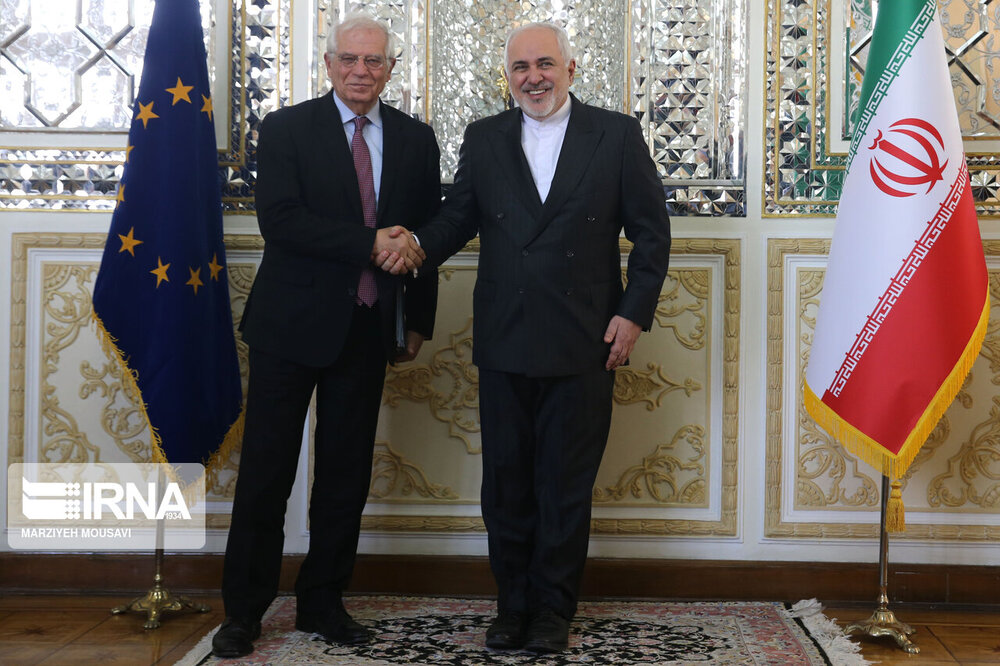Iran’s Zarif, EU’s Borrell discuss nuclear deal in Tehran

TEHRAN - Foreign Minister Mohammad Javad Zarif and European Union foreign policy chief Josep Borrell met in Tehran on Monday, discussing the 2015 nuclear deal, officially known as the JCPOA.
Borrell visited at a time that the fate of the JCPOA hangs in the balance.
Zarif and Borrell held two rounds of talks on Monday.
It was the first trip to Tehran by Borrell who replaced Federica Mogherini. He was accompanied by a delegation in his visit to Tehran.
In a separate meeting with Borrell, President Rouhani criticized the European Union for failing to honor its commitments under the JCPOA when the U.S. quit the deal and reinstituted sanctions on Iran.
In May 2019 Iran started to reduce its commitments to the JCPOA at bi-monthly intervals in response to the abrogation of the pact by the U.S. coupled with the European Union’s inaction to shield Iran’s economy from sanctions.
Rouhani said, “The Islamic Republic of Iran is still ready to cooperate with the European Union for resolving issues, and at any time that the other side (EU) fully observes its commitments Iran will also return to its commitments.”
Rouhani said the JCPOA was the fruit of 12 years of negotiations but its implementation has faced serious hurdles due to the U.S. unilateral exit from the agreement.
The Iranian president went on to say that his country has been fully committed to the inspection of its nuclear activities by the International Atomic Energy Agency and this policy will continue “otherwise we face a new condition”.
Rouhani also described European countries as Iran’s traditional partners and said Tehran attaches great importance to Europe.
The president also expressed hope that Iran-EU relations would expand through the efforts of the European Union high representative.
Borrell: I will use all my energy to keep the JCPOA
In his meeting with Rouhani, Borrell also said he will use his utmost efforts to keep the nuclear deal alive.
“As the High Representative of the European Union Foreign Policy I will use my utmost energy to create a strong interaction in line with protecting the JCPOA,” Borrell said according to a translation of his remarks.

The European chief diplomat said efforts should be made to remove hurdles on the way to implement the nuclear accord.
Borrell also said, “I am sorry that the European sides have failed to fulfill their commitments.”
The top European official also called Iran an influential country which can play an important role in establishing peace, stability and security in the region. “For this purpose, development of cooperation with Iran has always been important for the European Union,” he said.
France, Germany and the United Kingdom, the three European states signatory to the JCPOA, issued a joint statement on January 14 announcing they have formally triggered the JCPOA dispute resolution mechanism which could bring the Iran nuclear issue before the UN Security Council.
Borrell said on January 24 that he had extended the time available to discuss ways to save the nuclear deal.
“There is agreement that more time is needed due to the complexity of the issues involved. The timeline is therefore extended,” Borrell said in a statement.
Borrell said the joint commission that regulates the Iran nuclear deal will meet in February but did not give a date.
Zarif has warned Iran will consider quitting the nuclear Non-Proliferation Treaty (NPT) if the Europeans refer Iran’s nuclear case to the UN Security Council.
“If they (Europeans) take any action, the issue of quitting the NPT will be raised based on the letter of the President dating May 2018,” Zarif told ICANA in an interview on January 20.
Mojtaba Zonnour, chairman of the Majlis National Security and Foreign Policy Committee, warned on Monday that Iran will take the next steps if talks with Borrell in Tehran prove unfruitful.
Iran and the EU also discuss other pressing regional issues
Iranian officials also held talks with Borrell on other important issues.
During the meeting between Zarif and Borrell, the sides discussed sensitive situation in the Persian Gulf region, the United States’ so-called “deal of the century”, the Instrument in Support of Trade Exchanges (INSTEX) proposed by the EU trio of Germany, France and Britain but still not realized.
Rouhani also told Borrell that while terrorists are still active in the region the United States assassinated Iranian general Qassem Soleimani as the chief commander of the war against terrorism and “this was a great help to terrorists in the region.”
Borrell also held talks with Parliament speaker Ali Larijani.
NA/PA
